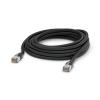-
Kč
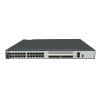
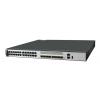
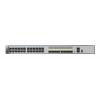
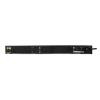
Huawei S5730-48C-SI-AC to zarządzalny switch (przełącznik) wyposażony w 24 gigabitowe porty Ethernet (10/100/1000 Mb/s) i 8 slotów SFP+ (10 Gb/s). Dodatkowo posiada jedno gniazdo rozszerzeń, do którego można podłączyć kartę interfejsów 4x QSFP+ (40 Gb/s). Wydajność przełączania urządzenia wynosi 680 Gb/s, a prędkość przekazywania pakietów 240 Mp/s. Obudowa została przystosowana do montażu w szafie Rack 19", switche tego typu są powszechnie stosowane jako przełączniki dostępu / agregujące w sieciach kampusowych lub przełączniki dostępu w centrach danych.
Oferowany produkt wspiera routing IPv4 i IPv6, w tym m. in. RIPv1/v2, RIPng, OSPF, OSPFv3, IS-IS, IS-ISv6, BGP oraz BGP4+. W pełni obsługuje multicasty, w tym także PIM-DM, PIM-SM i PIM-SSM. Oprócz tego zapewnia wysoki poziom zabezpieczeń oraz zaawansowaną funkcję QoS. Switch może działać jako klient SVF (Super Virtual Fabric), jest to technologia umożliwiająca wirtualizację architektury sieciowej przełączników rdzeniowych / agregujących, dostępowych i punktów dostępu do jednego urządzenia.
Najważniejsze cechy:
- 24 gigbaitowe porty Ethernet 10/100/1000 Mb/s;
- 8 slotów SFP+ (10 Gb/s);
- wydajność przełączania 680 Gb/s;
- prędkość przekazywania pakietów: 240 Mp/s;
- zarządzanie Layer 3 (m. in. OSPF i BGP);
- klient SVF;
- zasilanie AC.
Specyfikacja:
| S5730-48C-SI-AC | |
| Porty |
24x gigabit Ethernet 10/100/1000 Mb/s 8x SFP+ 10 Gb/s |
| Tablica dresów MAC | 32K |
| Wymiary | 442 x 420 x 44,4 mm |
| Wysokość | 1 U |
| Slot | Jeden dodatkowy slot rozszerzeń wspierający kartę interfejsów: 4x 40 GE QSFP+ |
| Napięcie wejściowe |
100 - 240 V AC 50/60 Hz
Maksymalny zakres: 90 - 264 V AC 47 - 63 Hz |
| Maksymalny pobór mocy | 62,4 W (bez dodatkowej karty) |
| Średni pobór mocy | 39,02 W (bez dodatkowej karty) |
| Dopuszczalna temperatura pracy |
0 - 1800 m: 0°C - 45°C (długotrwała) -5°C - 50°C (krótkotrwała)
1800 - 5000 m: Zakres temperatury spada o 1°C na każde 220 m |
| Dopuszczalna wilgotność | 5%-95% niekondensująca |
| Chłodzenie | Aktywne |
| Ochrona przepięciowa | ±7 kV |
| Właściwości oprogramowania | |
|---|---|
| Tablica adresów MAC |
IEEE 802. 1d compliance 32K MAC address entries MAC address learning and aging Static, dynamic, and blackhole MAC address entries Packet filtering based on source MAC addresses |
| VLAN |
4K VLANs Guest VLAN and voice VLAN GVRP MUX VLAN VLAN assignment based on MAC addresses, protocols, IP subnets, policies, and ports 1: 1 and N: 1 VLAN mapping |
| Niezawodność |
RRPP ring topology and RRPP multi-instance Smart Link tree topology and Smart Link multi-instance, providing millisecond-level protection switchover SEP STP (IEEE 802. 1d), RSTP (IEEE 802. 1w), and MSTP (IEEE 802. 1s) ERPS (G. 8032) BPDU protection, root protection, and loop protection |
| Routing IP |
Static route RIPv1/v2 RIPng OSPF OSPFv3 ECMP IS-IS IS-ISv6 BGP BGP4+ VRRP |
| Multicast |
PIM DM, PIM SM, PIM SSM IGMP v1/v2/v3 and IGMP v1/v2/v3 snooping and IGMP fast leave MLD v1/v2 and MLD v1/v2 snooping Multicast forwarding in a VLAN and multicast replication between VLANs Multicast load balancing among member ports of a trunk Controllable multicast Port-based multicast traffic statistics |
| Funkcje IPv6 |
Neighbor Discovery (ND) Path MTU (PMTU) IPv6 ping, IPv6 tracert, and IPv6 Telnet 6to4 tunnel, ISATAP tunnel, and manually configured tunnel ACLs based on the source IPv6 address, destination IPv6 address, Layer 4 ports, or protocol type |
| QoS/ACL |
Rate limiting on packets sent and received by a port Packet redirection Port-based traffic policing and two-rate three-color CAR Eight queues on each port WRR, DRR, SP, WRR+SP, and DRR+SP queue scheduling algorithms Re-marking of the 802. 1p priority and DSCP priority Packet filtering at Layer 2 to Layer 4, filtering out invalid frames based on the source MAC address, destination MAC address, source IP address, destination IP address, TCP/UDP port number, Rate limiting in each queue and traffic shaping on ports |
| Zabezpieczenia |
Hierarchical user management and password protection DoS attack defense, ARP attack defense, and ICMP attack defense Binding of the IP address, MAC address, port number, and VLAN ID Port isolation, port security, and sticky MAC MFF Blackhole MAC address entries Limit on the number of learned MAC addresses IEEE 802. 1x authentication and limit on the number of users on a port AAA authentication, RADIUS authentication, HWTACACS authentication, and NAC SSH v2. 0 HTTPS CPU defense Blacklist and whitelist IEEE 802. 1x authentication, MAC address authentication, and Portal authentication DHCPv4/v6 client/relay/server/snooping Attack source tracing and punishment for IPv6 packets such as ND, DHCPv6, and MLD packets |
| SVF |
Plug-and-play SVF client Automatic software and patch loading to clients One-click and automatic delivery of service configurations Independent client running |
| OAM |
Software OAM: EFM OAM CFM OAM Y. 1731 performance test |
| Zarządzanie |
iStack (using service ports as stack ports) Virtual cable test SNMP v1/v2c/v3 RMON Web-based NMS System logs and alarms of different levels 802. 3az EEE sFlow Intelligent O&M |
| Interoperacyjność |
Supports VBST (Compatible with PVST/PVST+/RPVST) Supports LNP (Similar to DTP) Supports VCMP (Similar to VTP) |






 Polski
Polski English
English Italiano
Italiano Español
Español Čeština
Čeština Српски
Српски Deutsch
Deutsch Ελληνικά
Ελληνικά Slovenský
Slovenský


